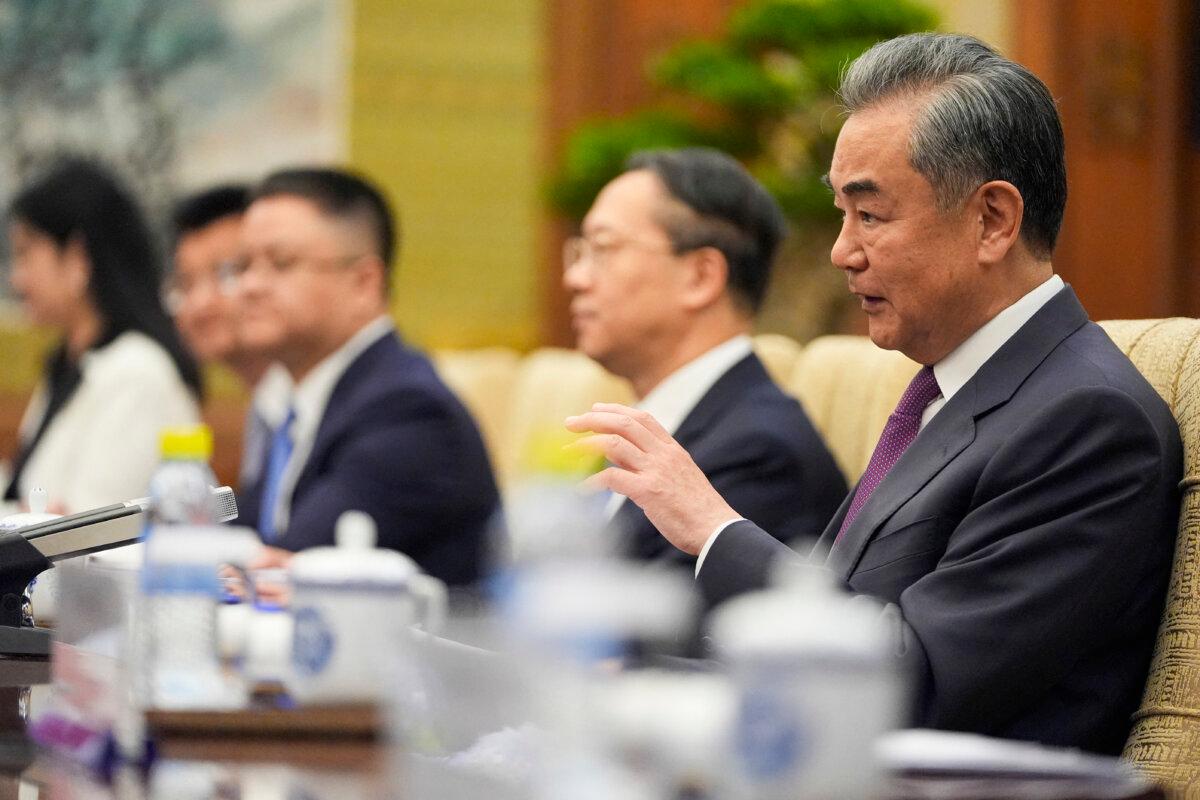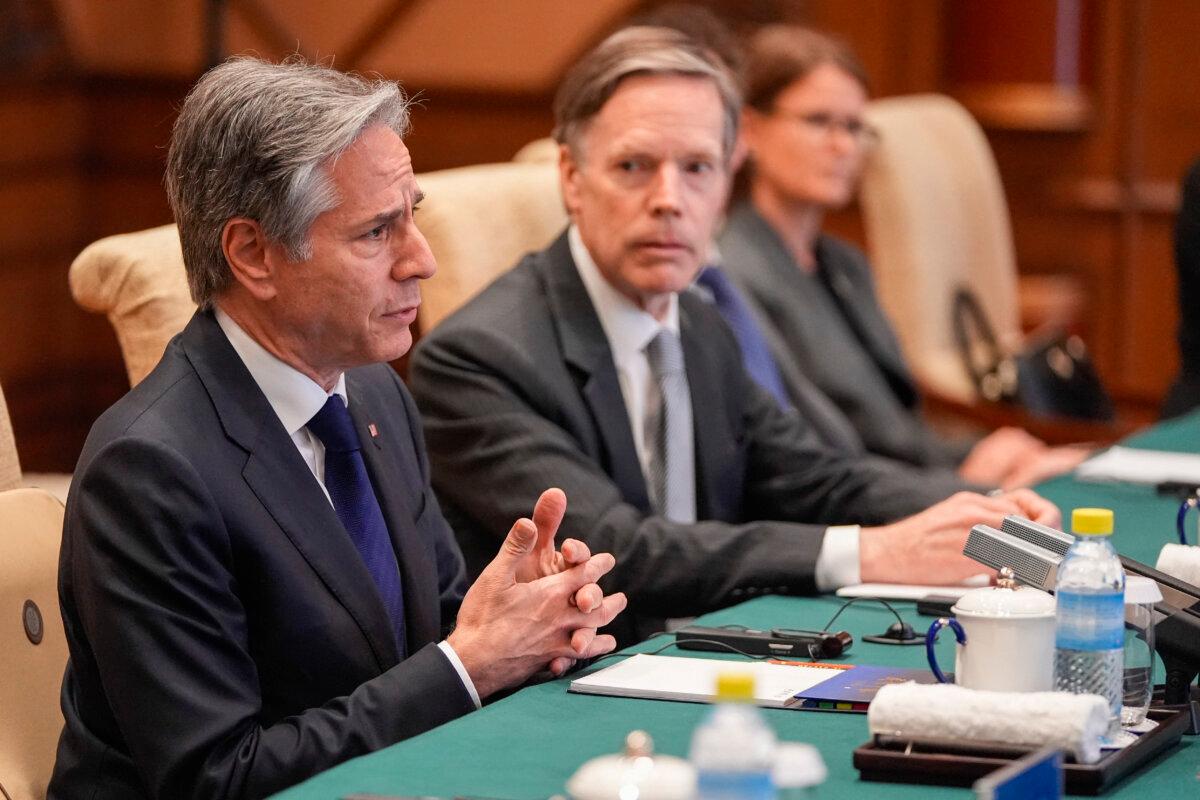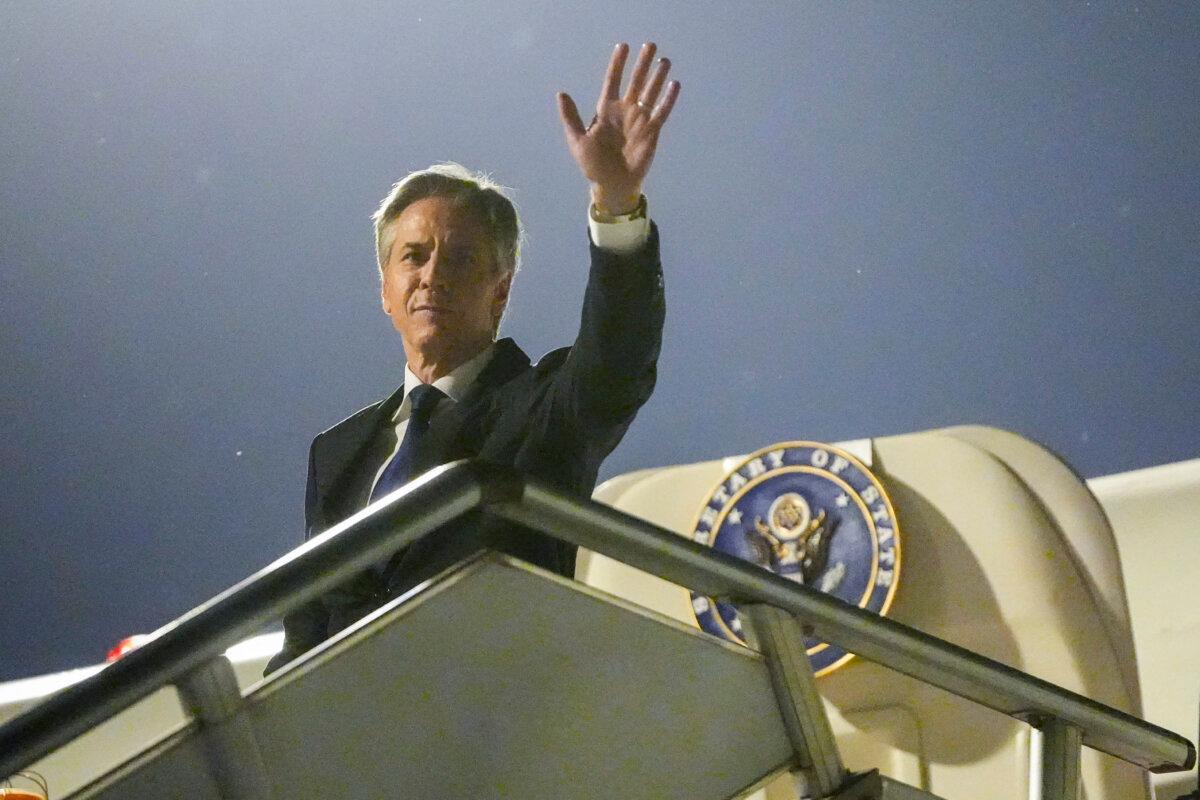- Talks with the Chinese sides were ‘candid’ and ‘constructive,’ Mr. Blinken said at a press conference as he wrapped up his visit on April 26
The Chinese Communist Party (CCP) is “powering” Russia’s war against Ukraine, and Moscow would “struggle” to sustain its attack without the Chinese support, Secretary of State Antony Blinken said on April 26 before leaving China, ending his three-day trip.
The trip marked Mr. Blinken’s second trip to China in less than a year, and on both occasions, he held face-to-face talks with Chinese leader Xi Jinping. Before concluding his latest trip, Mr. Blinken also met with the CCP’s top diplomat, Wang Yi, the public security minister, Wang Xiaohong, and Shanghai’s CCP chief, Chen Jining.
Mr. Blinken’s trip is part of the Biden administration’s continued efforts to engage with Beijing, with the goal of leveraging face-to-face communication to prevent unintended conflict. The timing of the trip comes as Congress recently renewed attention to the CCP’s ongoing campaigns to infiltrate different aspects of American society via political warfare.
Talks with the Chinese sides were “candid” and “constructive,” Mr. Blinken said at a press conference as he wrapped up his visit on April 26.
As one of the achievements of his three days of talks in Beijing, Mr. Blinken said the United States and China will host the first dialogues on artificial intelligence (AI) “in the coming weeks.”
“We’ll share our respective views on the risks and safety concerns around advanced AI and how best to manage them,” he said.
China’s Aid to Russia
The issue of China’s aid to Russia’s defense industry was at the top of Mr. Blinken’s agenda. During the meetings with Chinese officials, Mr. Blinken reiterated his “serious concern about the PRC providing components that are powering Russia’s brutal war of aggression against Ukraine,” using the acronym of China’s official name, the People’s Republic of China.
“Russia would struggle to sustain its assault on Ukraine without China’s support,” he said.
U.S. officials have renewed concerns about China’s support for Russia’s war efforts, saying Beijing is sending machine tools, chips, and other materials that have both civilian and military uses to help rebuild Moscow’s defense sector.
Treasury Secretary Janet Yellen warned that the United States is ready to sanction Chinese companies and financial institutions if they facilitate the flow of military goods to Russia, though she said nothing is imminent.
Beijing has denied doing so, but it maintains close relations with Moscow. Russian President Vladimir Putin ordered an invasion of Ukraine on Feb. 24, 2022, less than three weeks after he and Xi had declared a partnership with “no limits.“
Earlier this month, Xi met the visiting Russian Foreign Minister Sergey Lavrov in a show of solidarity between the two neighbors.
Furthermore, Mr. Putin confirmed on April 25 that he would visit China in May.
Overcapacity
Mr. Blinken also criticized the Chinese regime’s unfair trade practices and industrial overcapacity, which has threatened businesses and workers in the United States and elsewhere.
“China alone is producing more than 100 percent of global demand” for products like solar panels, electric vehicles, and the batteries that power them, as well as “flooding markets, undermining competition, [and] putting at risk livelihoods and businesses around the world,” Mr. Blinken said, describing the actions as “a movie we have seen before.”
“We know how it ends: with American businesses shuttered and American jobs lost. President Biden will not let this happen on his watch,” he said.
“We’ll do what’s necessary to ensure that American workers can compete on a level playing field.”
During a visit to China earlier this month, Ms. Yellen also pressed senior Chinese officials about the country’s industrial overcapacity, an issue that she said has become a top concern for Washington, Brussels, and some emerging markets like India.
The treasury secretary said on April 25 that to address the problem, she wouldn’t “take anything off the table.”
Mr. Blinken emphasized that the U.S. actions are not aimed at “holding back China’s development.”
“We want China’s economy to grow, but the way China grows matters,” he said.
Bilateral Talks
Mr. Blinken’s second trip to China as secretary of state took place as the United States and communist China remained at odds on various issues, such as Taiwan, trade, and technology. As the United States heads into the presidential election this year, concerns over the CCP’s election interference have come into focus.
Before departing Beijing, Mr. Blinken acknowledged the CCP’s efforts to meddle in the U.S. election.
“We have seen, generally speaking, evidence of attempts to influence and arguably interfere, and we want to make sure that that’s cut off as quickly as possible,” Mr. Blinken told CNN in Beijing.
President Joe Biden had warned Xi against meddling in the U.S. presidential election during their face-to-face meeting in Woodside, California, last November. The issue was raised again during the president’s phone call with the CCP leader earlier this month.
While meeting the CCP officials, Mr. Blinken brought up election interference.
“Any interference by China in our election is something that we’re looking very carefully at and is totally unacceptable to us,” Mr. Blinken said. “So I wanted to make sure that they heard that message again.”
According to a Chinese readout of the Xi–Blinken meeting, Xi told the visiting U.S. diplomat that the two nations should be “partners, not rivals,” a remark that contrasts with the CCP’s aggressive behaviors around the world. Critics have called out the Chinese regime for aiming to overturn the current U.S.-led international rules-based order.
Mr. Blinken reportedly told Xi that the United States would not seek a “new Cold War,” according to the Chinese readout.
At the time of writing, the State Department has not released a readout or statement on the Xi–Blinken meeting.

Mr. Wang, speaking to Mr. Blinken, warned the United States not to “interfere in China’s internal affairs” and not to step on “China’s red lines on China’s sovereignty, security, and development interests,” according to the State Department.
For years, the CCP has deflected international criticism of its policies toward Taiwan, Hong Kong, Xinjiang, and Tibet by arguing that they are “internal affairs.” The Chinese regime has also legitimized its objective of seizing Taiwan, a self-ruled democracy with a democratically-elected government, as part of its “core interests.”
Story continues below advertisement
Mr. Blinken told his Chinese counterpart that “active diplomacy” was needed for both nations. “We’re as clear as possible about the areas where we have differences, at the very least to avoid misunderstandings, to avoid miscalculations,” he added.
Political Prisoners
During the press conference on April 26, Mr. Blinken said China’s human rights issues came up during the talks.
“I raised the cases of American citizens who are wrongfully detained and those who are subject to exit bans,” he said. “President Biden and I will not rest until they’re back with their families where they belong.”
One of the Americans currently being held is Mark Swidan, a Texas businessman who has been wrongfully detained in China since 2012. He was sentenced to death with a two-year reprieve in 2019 after being charged with drug-related crimes. A Chinese court denied his appeal and upheld the ruling in April last year.
“I also raise concerns about the erosion of Hong Kong’s autonomy and democratic institutions, as well as transnational repression, ongoing human rights abuses in Xinjiang and Tibet, and a number of individual human rights cases,” Mr. Blinken added.

Days before Mr. Blinken’s trip, over 40 civil society organizations—including Campaign for Uyghurs, Hong Kong Watch, Safeguard Defenders, and Friends of Falun Gong—issued a joint statement telling Mr. Blinken that “strong words alone” will not be enough to compel the Chinese regime to stop committing human rights abuses.
“Human rights must not be delinked from trade and the United States must not accept Beijing’s egregious and ongoing human rights violations in exchange for promises that will inevitably be broken by Beijing,” the statement reads.
The organizations said Mr. Blinken should use his China trip to “call for the release of all political prisoners” in China, Hong Kong, Xinjiang, and Tibet.
Mr. Blinken should also “issue targeted sanctions against Hong Kong and Chinese officials for human rights violations,” according to the statement.
The latest State Department’s human rights report on China, which was published on April 22, listed several political prisoners, including retired Uyghur medical doctor Gulshan Abbas, Chinese rights lawyer Gao Zhisheng, Tibetan Buddhist monk Go Sherab Gyatso, Chinese citizen journalist Zhang Zhan, and Falun Gong practitioner Zhou Deyong.
The report also discussed covert Chinese operations to silence and punish critics in the United States and elsewhere, deploying tactics such as harassment.
On his previous trip to China in 2023, Mr. Blinken raised China’s human rights violations in Xinjiang, Tibet, and Hong Kong. However, since then, the Chinese regime has not made any policy changes to address U.S. concerns.
‘Destruction of Our Country’
The House Oversight and Accountability Committee held a hearing focusing on the CCP’s political warfare against the United States on April 17.
“What is the CCP? It is the ruling authoritarian regime of China. While it is enslaving its own people in forced labor camps in China, it is also brazenly engaging in dozens of forms of warfare against America. Each warfare tactic seeks the destruction of our country,” said Rep. James Comer (R-Ky.), the committee’s chairman, at the hearing.
Mr. Comer gave a long list of targets the CCP has been seeking to infiltrate, including farms, businesses, K-12 schools, universities, research institutions, technology, defense industry, critical infrastructure, media, social media, Silicon Valley, and Wall Street.
The CCP is using its “united front” networks to run different influence campaigns, Mr. Comer said.

The CCP’s United Front Work Department (UFWD) answers directly to the Central Committee, which is headed by Xi. The UFWD coordinates thousands of groups to carry out foreign political influence operations, suppress dissident voices and activities, gather intelligence, and facilitate the transfer of technology to China. Ultimately, the CCP uses the UFWD to advance its economic, political, and security interests around the world.
“The Office of the Director of National Intelligence consistently recognizes the CCP as ‘the threat’ to American security and our economy. Yet too many agencies are not doing enough because they don’t have a China strategy, creative solutions, and proactive, aggressive methods,” Mr. Comer added.
Retired Air Force Brig. Gen. Robert Spalding was one of the witnesses at the hearing. He warned about how Chinese companies are proxies serving the CCP.
“Chinese companies working on behalf of the Chinese Communist Party influence American businesses and financial institutions with seductive promises,” Mr. Spalding said.
“In turn, these American organizations influence our political process to ensure we maintain an economic connection to the party’s influence, simultaneously eliminating manufacturing jobs for America’s working class.
“State, local, and federal politicians are influenced by Chinese investment and the often unfulfilled promise of jobs in their districts,” he added.
@The Epoch Times





